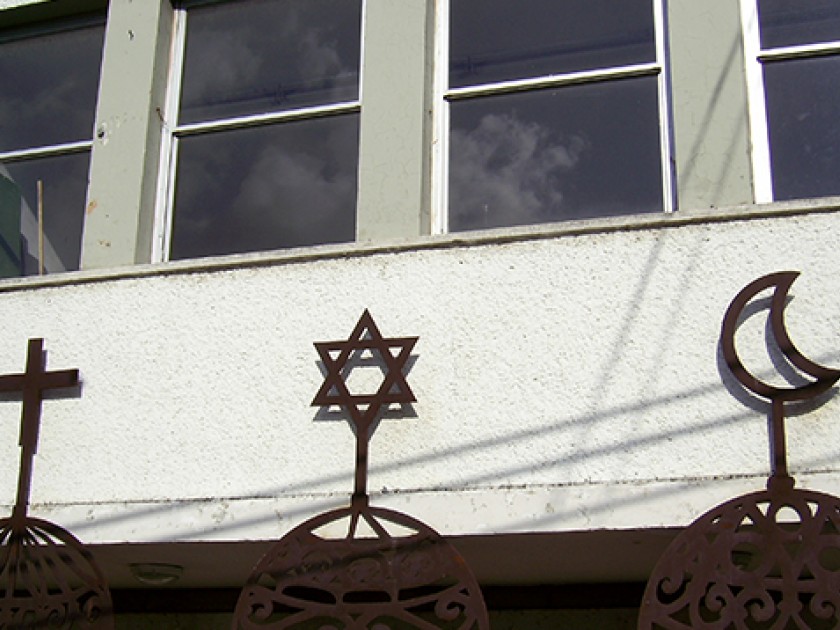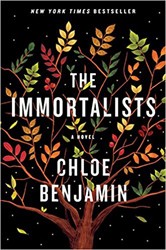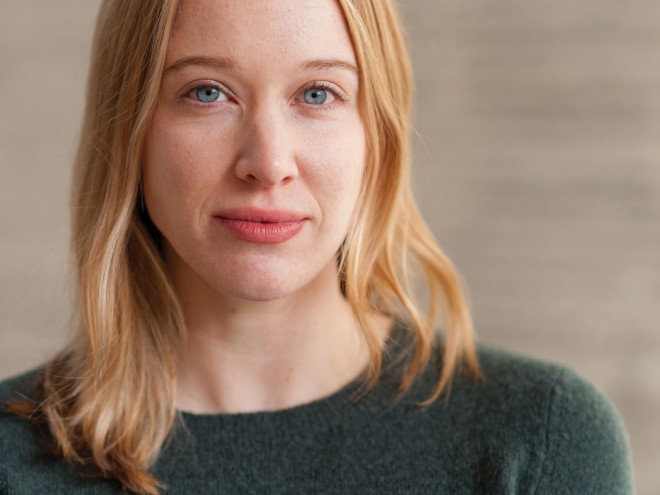
Image via Flickr/Ze’ev Barkan
Chloe Benjamin, author of The Immortalists, writes for JBC’s Visiting Scribe series about how growing up in an interfaith family has inspired her to explore issues of faith and religion in her writing.
I often attribute my interest in religion to the fact that, after my parents’ divorce, I grew up with two of them. My mom is the daughter of an Episcopalian minister, and as a child, I went to Sunday School at our local Episcopalian church. My dad, meanwhile, is ancestrally Jewish but presently atheist. I often tease him about the fact that his first wife is a minister’s daughter, and his second — my stepmother, Ellen — is a Jewish spiritual director.
Ellen grew up in Lorraine, Ohio, in a conservative Jewish family. Now a member of San Francisco’s reform synagogue Temple Emanu-El, she brought Jewish history and culture into our home. I was fascinated by the stories, the language and the traditions, from praying over candles, wine and challah on Shabbat to the rituals of Passover. When I asked Ellen to teach me Hebrew, she found an introductory textbook clearly geared toward children half my age and helped me learn.
As the years passed, I did not go through a confirmation or a bat mitzvah. Still, I remained curious about religion. (Broadening my purview, I even asked for Islam for Dummies one birthday!) I never felt pressure from either side of my family to choose. My dad still identified as an atheist, though he went to temple with Ellen. My mom’s side of the family has always been progressive, pro-gay rights, feminism and rebellion in a church that didn’t always feel the same way. Encouraged, I explored religion in my work. The thesis for my graduate program in Creative Writing was a collection of linked short stories that followed one family’s experience of Christianity and sexuality. Religion was less prominent in my first published novel, The Anatomy of Dreams, but it became a focus again in my second, The Immortalists, released this month.
The Immortalists follows the Golds, a conservative Jewish family in New York’s Lower East Side. In 1969, the four Gold children hear of the arrival of a mysterious woman who claims to be able to tell anyone their date of death. The grandchildren of Eastern European Jews who fled persecution, the siblings receive their prophecies on the fifth floor of a building on Hester Street. The novel then follows each of them over five decades of American and interpersonal history — and questions the way that the fate, chance and expectation shape their futures.
The Gold siblings each have different orientations toward Judaism, just as they have different orientations toward their prophecies. Simon, the youngest, is a gay man who feels condemned by Leviticus. Klara becomes a magician whose belief in magic parallels her father’s strong religious faith in surprising ways. Daniel is a military doctor whose wife, Mira, brings Judaism back into his life. And Varya, the eldest, identifies most with Judaism’s emphasis on the power of words and stories.
I was drawn to Judaism in the context of this novel for multiple reasons. While Christianity places great focus on life after death, Judaism’s gaze remains fixed on olam ha-ze: this world. I was curious about how the siblings would approach their mortality without the imaginative “escape hatch” of heaven. I was also eager to plumb my own family history on my father’s side. Like Saul, the patriarch of the Gold family, my great-grandfather, Max, ran a tailoring business in New York City. And just as the parents of Saul and his wife, Gertie, came through Ellis Island from Eastern Europe, so too did my ancestors enter the country in New York after long journeys from Poland, Ukraine and Lithuania.
My grandmother’s ancestors were Jews who fled from Poland, as well as the Ukrainian pogroms. My grandmother attended Hebrew school, but organized religion was not often mentioned in the family home. Still, she found herself fascinated by the range of cultures that surrounded her in New York.
“When I began to study French at Fieldston,” she wrote to me, “my teacher invited members of the class to attend the group performance of Handel’s Messiah. I was dazzled and began a lifelong habit of annual attendance to the event. With a boy in my class, I spent many Saturdays investigating the varied ethnic enclaves of Manhattan: Hungarian, Polish, Greek. Each visit included a meal in a local eatery. This was our own idea and firmly fixed in my mind a leitmotif of what I call ‘OPR,’ or other people’s religions. Without naming it as such, I was a budding anthropologist, visiting the core institutions of polyglot New York City. This has been my most compelling interest ever since.”
Years later, as a more mature woman and a mother, she became involved in her local Planned Parenthood. It was there that she met a man named Ed Lane, a Unitarian minister, and began to attend his church. Eventually, she completed a Masters Degree at the University of Pennsylvania in primitive and ancient religions.
“I have found favor with a quasi-religious affirmation of the sanctity of the human mind,” she continued. “The investigation of others’ adherence has remained compelling. With Felix Adler, the Jewish founder of Ethical Culture, I find that ‘The place where men (sic) gather to seek the highest is holy ground.’ With Martin Buber, I think that God is ‘in the transactions of one human mind to another.’”
My grandfather, meanwhile, grew up in a very Jewish neighborhood in New York City’s Upper West Side. His parents belonged to a Conservative temple on West End Avenue; he has memories of being stopped on the street and asked to help make up a minyan. Some of my favorite family stories come from his upbringing — such as the time his mother, my great-grandmother, buried the silverware after she caught one of her children using it for something non-Kosher! When he chose to leave the family business, his parents worried about how he would function in a Gentile world. Finally, his father took him to lunch with a group of Gentile businessman friends, who helped to lessen those fears.
Although my grandfather eventually moved away from Jewish observance — even exploring Unitarianism with my grandmother — he told me that he still feels culturally Jewish in many ways.
“I was emotionally attuned to Israel’s welfare in its battle to exist,” he wrote. “In my culture, the Jewish religion was never a big deal — but the sense of being Jewish was. So there was not much rebellion in going to a Unitarian Fellowship. It didn’t seem to threaten my sense of Jewishness much, if at all.”
His comments drove home to me what I’ve heard many of my Jewish family members and friends say: that what it means to be Jewish goes beyond attending religious services, that it is a much broader cultural identity. Like my grandparents, I remain fascinated by the ties that bind Jews to other Jews — and those that bind Jews to all religious seekers.
In the delightful and surprising way that life brings things full circle, my stepmother, Ellen, became a counselor for interfaith couples: a perfect fit for our diverse, modern family. I can’t help but see the parallels between family and religion. Both ideally offer a sense of solace and community — a connection to what lies beyond the self. Like my great-grandparents, my grandparents and my parents before me, I’ll hold tight to those I love as I keep searching.
Chloe Benjamin is the New York Times-bestselling author of the novels THE IMMORTALISTS and THE ANATOMY OF DREAMS, which received the Edna Ferber Fiction Book Award and was longlisted for the 2014 Center for Fiction First Novel Prize. A San Francisco native, Benjamin is a graduate of Vassar College and of the University of Wisconsin, where she received her MFA in fiction. She lives with her husband in Madison, Wisconsin.


